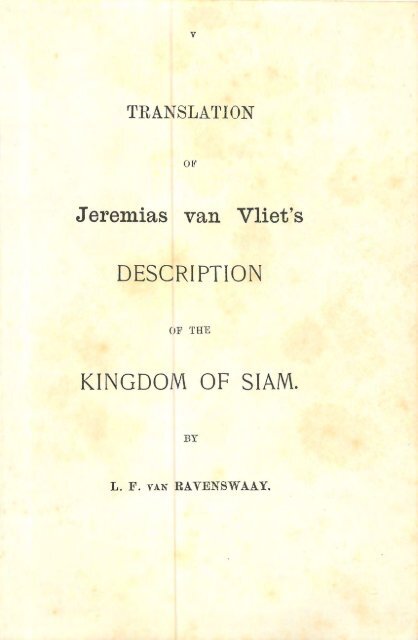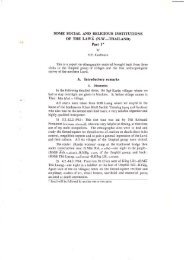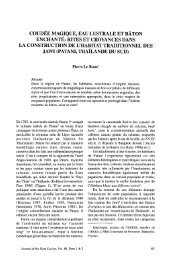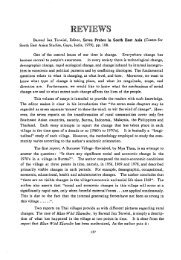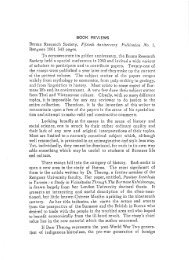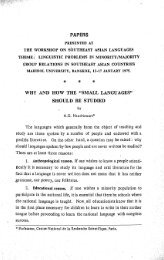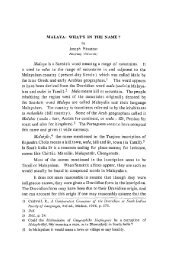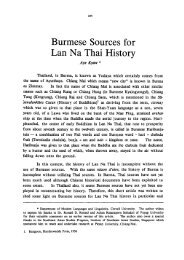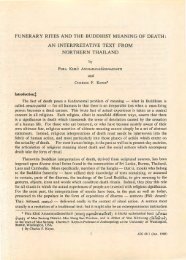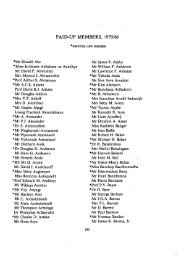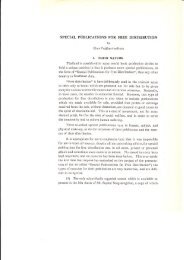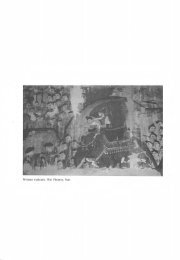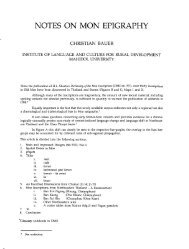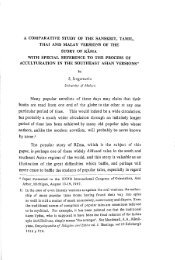Jeremias van Vliet's - Siamese Heritage Protection Program
Jeremias van Vliet's - Siamese Heritage Protection Program
Jeremias van Vliet's - Siamese Heritage Protection Program
You also want an ePaper? Increase the reach of your titles
YUMPU automatically turns print PDFs into web optimized ePapers that Google loves.
v<br />
TRANSLArriON<br />
<strong>Jeremias</strong> <strong>van</strong> <strong>Vliet's</strong><br />
DESCRIPTION<br />
OF THE<br />
KINGDOM OF SIAM.<br />
BY<br />
L. F. VAN RAVENSWAAY.
viii<br />
As the translation has been from the Old Dutch into a language<br />
foreign to me I would ask the indulgence of my readers for any<br />
idiomatic errors.<br />
My thanks are due to Mr. H.fme Sheridan for a translation of<br />
the tn ragl'aph relating· to Inheritance, which I have adopted in extenso,<br />
aa
[ 6 ]<br />
In order to better analyze the proposed subjects<br />
I will on general lines ( in order not to detain the<br />
reader unnecessarily) describe the origin of the <strong>Siamese</strong><br />
race and the situation of the Kingdom of Riam,<br />
referring the reader to the book of Schouten in the<br />
year 1632, which he has presented to the Governor<br />
General and Council of India.<br />
When and by More than two thousand years ago the country<br />
whom Siam of Siam was an uninhabited wilderness. In a few<br />
was discovered<br />
and explored. places there lived some hermits and heathens (who<br />
had offered their "bodies to the gods) and a.s we have<br />
heard from some reliable persons ( yes, even front<br />
some old learned men) there wits in Ohinrt at that<br />
time an Emperor's son who attempted his fctther's<br />
life ancl to take the imperial crown, in which attempt<br />
however he did not succeed. The Emperor intendecl<br />
to have his rebellious son and his fvllowers executetl<br />
for this crime, "but as he sn3pecter1 that the nobility<br />
itnd the community had htken the side of his sna<br />
(who was very intelligeut and ha,d many remark ftble<br />
gifts of natui·e) his Majesty after many supplications<br />
was persuaded not t•> take the life of his sO tl<br />
and his followers, provided that they a.ll should leave<br />
China and that they should wander as outlaws a,nd<br />
never return again.<br />
'I'hese exiles tt·iecl to populate uninhabited<br />
countries and to extend their power. 'l'hey travelletl<br />
first through the Janel of Ohiampa, aftet· that O
The sovereign<br />
government<br />
and power of<br />
'the king.<br />
[ 13]<br />
broad and straight streets but severa,l good canals.<br />
The greater part of the city is one great conglomeration<br />
of streets, alleys, canals and ditches. During<br />
high water boats cat;. ct·oss most of the streets and<br />
even reach tlw houses.<br />
The houses are of poor constmction, but the<br />
town is adorned with a bon t 4!)0 fine temples and<br />
monastaries, which are all cleverly and sumptuously<br />
built with a great numbet· of te>w3t'.3 1 p,rmmids and<br />
innumer:1.ble iun.ges made of all kind of materials.<br />
'l'he palace of the king is great a ud magnificent<br />
and lies on tl1e bank of the river like a separate well<br />
built town, embellished with 5 high t o-.vet·s and many<br />
fine gilded buildings. The pa.lace ht'Ls been very<br />
much improved by the present king. At the land<br />
side there is a large sq nare which htely has been<br />
surrouuded by [L stone wall. Only one street and<br />
two little pathways lead to the palace: so that it<br />
is now better protected against an attack of<br />
the population during times of revolution or of<br />
neighbonring enemies. But this stone wall will<br />
not be able to withstand a Emopean army. This<br />
city wall is thick and heavy and built of brick and<br />
follows the course of the river. lt has no propet·<br />
fonndation nor projections not· bastions like<br />
a real fortress and could be desti'Oyecl easily by<br />
a.rtillery. But considering Indian conditions,<br />
.T uclia. is a strong, beautiful, well situated, safe<br />
and well populated town, and is unconq uera.ble for<br />
hostile Indian kings as they could not stay any<br />
longer than six months for the yearly inundation<br />
by the river wottlc1 force them to leave the plains.<br />
Since the time that the Kingdom of Siam was<br />
established the King luts always had almost sovereign<br />
power, but according to the written laws His Majesty<br />
had to consult the imperial council, and where His<br />
Ml.l.jesty used bad j uilgment, partiality or exaggeration,<br />
the Mandarins had the po·wer to check him.
[ 17 ]<br />
Usually this titles for absolute kings (after the·<br />
dignity of the legation had been set forth in the<br />
introduction of the message) are the divine, illustrious,<br />
invincible, most powerful and highest :M:aster<br />
of a hundred. and one Golden Crowns and of kings<br />
adorned with nine kinds of pt·ecious stones, the greatets<br />
ancl highest divine JYLtster of the immortal Souls,<br />
the most holy, all seeing and overshadowing supreme<br />
n1ler of the most noble and great empire of Siam.<br />
His kingly throne is t.he beautiful and immense town<br />
of J11dia. The many roads leading to this brilliant<br />
town are crowded with people. This is the supreme<br />
cnpitnl of the world adorned with nine kinds of<br />
precious stones.<br />
The ruler of this beautiful country is more than<br />
the gods, and his house is ma.de of gold ancl precious<br />
stones. He is the eli vine Mastet· of the golden<br />
thrones of the towers, of the white, red and round<br />
tailed elepltan ts, ::.11 three of which are excellent<br />
walkers and which the supreme god of the nine<br />
va.rious gods hns given to nobody else. He is the<br />
god-like Master of the victorious sword by the perceiving<br />
of which many have become frightened and<br />
clefeat.ed. He is the greatest Master who is equal<br />
to the four-armed go cl of war.<br />
The king is very fond of the
"Tho Luxury and<br />
ext••avagance of<br />
the King.<br />
[ 20 ]<br />
The other women (tho3e who already had<br />
given birth as well as those who had not) had their<br />
l1air shave:l off and received two cuts on the head<br />
a:1el they were told that God had given theit· lives<br />
into the hands o£ the ldng and that they ought to<br />
die but as the king was merciful and more gracious<br />
t\an the gods they could all go home, except the<br />
four already mentioned women who were thrown<br />
unlet· ihe posts of ihe Petoutsiau.<br />
With the great authority and the usurped<br />
powers of the king we must also notice that the<br />
J>l esent luxury and extravagance even smpass<br />
those of former times. Fot· the wives of the<br />
greatest manlarins (being healthy and of good<br />
appearance) were not alloweJ to sta,y longer than<br />
3 or 4 days outside the court of the queen. They<br />
were brought inside the pahce under pretext that<br />
they had to greet the king. Sometimes his<br />
Majesty himself selected the prettiest maidens and<br />
daughters of the greatest men, and these wometl<br />
were given him as concubines.<br />
When he became king, his Majesty- to-ok also<br />
his first wife's sister and het· mothet· as h is concu-<br />
1lines under pretext that they vvere too noble to be<br />
given avYay to others. With this mother and the<br />
daughter he has had ehilclren. The mother died in<br />
1683 and the funeral ceremonies were more brilliant<br />
than those of any othet· queens during the lasb<br />
ceuturies.<br />
Although the religion anrl the laws forbid the<br />
mandarins and especially the kings to ch·iu k spirits,<br />
and moreovel' this is looked upon as being very scanrlalous,<br />
his Majesty is usually uncler the influence of<br />
drink three times a da,y, viz., during the morning<br />
after breakfast, during the afternoon and during the<br />
evening when he has given audience to his mandarins<br />
an cll1as returned from his throne into his palace.
With what<br />
splendour the<br />
King appears<br />
once a l(ear In<br />
public when<br />
going to the<br />
Nappetat.<br />
[ 23]<br />
It is an old custom in Siam that the king eve1·y<br />
Year at the end of October or in the beO'inninO' of<br />
0 0<br />
November comes outside the palace with the<br />
gteatest splendout· and followed by his whole court,<br />
and all the mandarins, nobles aud offi.cet·s of the<br />
country. First ene procession on land is organised<br />
and after this many trips on water. A visit is paid<br />
to the p1·incipal temple to make offerings to the<br />
gods and to pray fo;· a long life for the king aiJ(l<br />
the welfare of the country.<br />
The procession on land is not arranged in the<br />
same way every yea.r but occasionally it is as follows:<br />
First come in sbtely order going f t·om the palace<br />
to the principal temple called Nttppeta.t about 8:><br />
to 100 elepllrwts, which are sumptuously decorated.<br />
On each of these elephants is seated, besides two<br />
armed men, a llHtllda.rin in his gilded little house<br />
having in front of him a golden basin containing cloth.<br />
and presents for the priests. Then follow .50 to<br />
6J elephants, ·on each of which are sitting 2 to 3<br />
men, each of whom is armed with bows and atTows.<br />
After this come, also seated on elephants, the 5 to 6<br />
gt·eatest men of the kingdom, .3ome of them wearinggolden<br />
crowns but. eilch with his golden or silver<br />
uetei uux: ut· any other mark of honour given to him<br />
by the king. 'fhey are accompG \\·ho are g01·geously<br />
dressed a.nd ca.ny ex:celle!Jt arms. The<br />
musicians who follow the soldiers phy on pipes,<br />
tt·omboues, horns and drums an:l the sound of all<br />
these instruments bgether is very melodious. The<br />
horses and elephants of the king are adorne(l<br />
copiously with gold and precious stones and :u·e<br />
fo ll owed by many ser<strong>van</strong>ts of the court canying
[ 24]<br />
fruits and other things to offer. Many mandarins<br />
accompany these ser<strong>van</strong>ts.<br />
Then follow on foot with folded hands and<br />
stooping bodies (like eve1·yone who rides or walks<br />
in front of the king) ma.ny nobles, among them<br />
some who are cro,vned. " Then comes the red elephant<br />
decorated ve1·y nicely with gold and precious<br />
stones. Behind this elephant follow two distinguished<br />
men, one of them carrying the royal sword<br />
and the other one the golden standard, to which a<br />
banner is attached. A gilded throne follows after<br />
them showing how former kings used to be carried<br />
on the shoulders of the people, and then follows His<br />
Majesty sitting on an elephant and wearing his royal<br />
garments and his golden crown of pyramidal<br />
shape. He is surrounded by many nobles and<br />
ccmtiers. Behind his Majesty comes a young<br />
prince, the legal cl1ild of the supreme ldng, who<br />
nt present is eleven years old. ThG king's brother,<br />
being the nearest heir to the throne, fvllows then<br />
with great splendor, and. sea.teJ on elephants in<br />
little closed houses comA after this the ldng's<br />
mother, the queen ttncl his Majesty's children<br />
nml the concubines. Finally many courtiers<br />
and greJ.t men 0 11 horseback, and 300 to 400<br />
soldiers who. close the procession.<br />
Altogether about six to seven thousand persons<br />
participate in this ceremony, but only his Majesty,<br />
his wives, his children, his brother, the four<br />
highest bishops and other high priests enter the<br />
temple. Having stayed inside the temple for rcbout<br />
two hours the kin g and the whole splendid tmin<br />
retmn to the palace in the same order as here<br />
described. The streets are very crowded with<br />
people from the palace to the temple but every one<br />
is lying with folded. hands ancl the heacl bent to the<br />
earth. It is forbidden to any one to look at the<br />
l;:ing's mother, his wives or children and the people
The Pegu<br />
ambassador in<br />
Slam.<br />
l32 J<br />
grown rusty and the othet· wctr materials were<br />
scattered all over the country, so the Pegu soldiers<br />
were ready before the <strong>Siamese</strong> and destroyed many<br />
of their towns. At last they appeared befot·e ,J udia<br />
which town they thought to conquer very easily. But<br />
the <strong>Siamese</strong> prince marched with his army against<br />
the enemy and met them lu.lf a mile ab we the<br />
town near a ruined temple which is still existing.<br />
Scarcely had the two armies te king.;; n>Lnlly sent t) the fl'ontiet·<br />
of Pegu in the cll'y season, pt·ovad to be sufficient<br />
to check the attn.eks of the Pegues.<br />
In 1634 the king of Pegu sent an ambassador<br />
to Siam in orde1: to stop the state of war and to<br />
make a treaty of peace. But the ambassador made<br />
the condition that the prince of Siam, who is the<br />
ldng's only brother I.Lncl heir to the ct·own of Siam,<br />
should marry the king of Pegu's d
Rebellion of<br />
Patany, tho<br />
<strong>Siamese</strong><br />
king's vassal<br />
state, and the<br />
unsuccessful<br />
attempt to<br />
subject Pntany.<br />
[ 37 J<br />
The kingdom of Patany has been subjected to<br />
Siam since olden times but was only bound to bring,<br />
every year, homage to his Majesty the king of Siam<br />
with the golden and silver flowers and in times of<br />
wat· to send in assistance a few thouiiancl soldiers.<br />
The princes and princesses of Patany received titles<br />
from the <strong>Siamese</strong> king. They received the title of<br />
Pra 'tJiau. From that may be concluded the good<br />
right of the <strong>Siamese</strong> king over the government of<br />
Patany. But by the ambition of the late princess to<br />
obtain the highest power and by the great authority<br />
of some mandarins especially Dato Bestaar ( who<br />
were not loved by most of the Orangh Cayos ) the<br />
people of Pahwy became rebellious against Siam<br />
during the change of succession in that country.<br />
The ambitious princess and mandarins already<br />
mentioned made known in public that the king of<br />
Siam di.l not have the right to wear the crown and<br />
that he has killed the true l\ings and their heirs. For<br />
this reason the P
[ 38 J<br />
to give Sia.m aga.in the same power as bef01·e. To d()<br />
this His Majesty called to arms in Lygoor an army of<br />
60,000 men with plenty of elephants, horse;:;, artille•·y<br />
and ammunition, and placed over this army fom·<br />
generals namely the Oyas : Lygo:n·, Cala.hom,<br />
Berckelangh and Rabisit, Moreover an armada.<br />
of 40 junks and galleys with ammunition<br />
and the necessary provisions were sent there<br />
The four chiefs got the order to attack the towll<br />
of Patany at the end of April or to besiege<br />
and take the town hy staning it. But in.<br />
order to carry on the war with more glot·y ancl<br />
to ft·ighten the Patanese and their neighbom·s more<br />
the king and the mandarins of Siam asked for the<br />
assistance of a few ships of the Governot· Genet·,tl<br />
and Council of India. This request was founded oa<br />
various motives, lHtmely, 1 o the fl'iendsh.ip with the<br />
Netherlands nation, which His MajP.sty had kept up<br />
for a long time, 2° the assistance of which his Kit1gly<br />
Grace, the Pl'ince of Ot'
G,..at<br />
pl'epal'atloRs<br />
.,o,. a second<br />
campaign but<br />
by lntel'ventlon<br />
of the king of<br />
Que(la peace<br />
was made<br />
.between Slam<br />
and Patan,..<br />
uncel'taln<br />
.,,.lendshlp<br />
between<br />
illPI'&can and<br />
Slam.<br />
[ 411<br />
After the first war great numbers of new soldiers<br />
were called to arms for the second campaign<br />
which had been poetponed for one year on account<br />
of the bad harvest of rice. In the meantime<br />
more than one hundred new vessels had been<br />
built in Siam and the neighbouring countries. and<br />
the old vessels had been repaired. All these vessels<br />
were to take part in a second war with Patany,<br />
so that·according to all appearances Patany would<br />
have had a hard time in 1636. But by intervention<br />
of the king of Queda, and from the predictions of<br />
the <strong>Siamese</strong> priests, the king changed his mind. By<br />
order of the king, Berkelangh sent ambassador,;<br />
to Patauy in ordet• to offer for the last time peace<br />
to the queen and the mandarins (as a warning and<br />
under pretence of having pity for the Patanese).<br />
The ambassadors h[),d also to tell the Pa.tanese that<br />
the war had been prevented by the king of Queda<br />
and the <strong>Siamese</strong> priests, and if the Patanese would<br />
send legates to Siam to ask mercy his Majesty<br />
without any hesitation would be very glad to gt·ant<br />
such. In March 1636 appeared thereupon some<br />
ambassadors, who were received by Berkelangh.<br />
They were as much humble as the <strong>Siamese</strong> showed<br />
pride. 'rhe result of the preliminary negotiations<br />
was that in .August next a distinguished person<br />
appeared as a legate. He presented the golden<br />
and the silver flowers to the king as a sign of subjection.<br />
This was accepted by his Majesty with<br />
great pleasure, and herewith peace was made<br />
between the two kingdoms. No claims were made<br />
from either side for insults suffered or for<br />
damages.<br />
The kings of the A.rracan and Siam have lived<br />
in peace and in alliance for a very long time without<br />
either of them being a vassal or tributary to the<br />
other. To maintain this alli[),uce they sent each other<br />
nmbassador5 every year. This was done, not only<br />
to promote commerce, but also for reasons of policy.
[ 42]<br />
The alliance lasted until the death of the<br />
great king. But as soon as this king had<br />
passed away the friendship was finished between<br />
the two kingdoms, for the present king having<br />
been crowned and having reached the supreme<br />
power sent his ambassadors to Arracan as before,<br />
although no ambassadors had come from<br />
Arracn.n. The king of Arracan did not receive<br />
the legation, saying that he could not recognise<br />
an illega.l usurper as king of Siam, and he therefore<br />
refused to give audience to the ambB.Iilsadors<br />
or to pay any honour to them. The king of<br />
Arracan did not allow the ambassadors to return,<br />
but did send a boat with some of his subjects to<br />
Tannassary to trade as usual. The governors out<br />
there rep01•ted this to the <strong>Siamese</strong> king, and asked<br />
the king's advice what to do with these people from<br />
.A.rracan. His Majesty commanded that their boats<br />
and their goods should be seized and the men taken<br />
prisoners and brought to Judia. ]'or mo1·e than<br />
two years these people ft•om Arra.can have been<br />
lrept prisoners, and during all this time no negotiations<br />
about these men have taken place, nor. has<br />
any hostility been sh,>wn by either side, both<br />
parties keeping quiet until November last year.<br />
At that time some galleys and other small. ships<br />
were sent from Arracan to the island of Mirghy<br />
and to Tannassary with a view to plunder, but as<br />
many Moors had left for l\lasilipathatn and as those<br />
who had not left were on their guard the Arracans<br />
could do very little.<br />
At last the people of Tannassary have seized<br />
some Arracans and sent them to Judia.. These<br />
prisoners after a sharp investigation confessed that<br />
the king of Arracau intended to conquer Myrghy<br />
and Tannassary, but ft•otn want of a sufticient army<br />
had postponed the expedition until be might have<br />
a better chance. In the meanwhile be wanted
[ 48]<br />
the Japanese, has dt·iven the rest of them out of the<br />
country (tv the gladness of the inhabitants) and<br />
in doing so his Majesty has freed and cleared Siam<br />
of them. The great men in the country and the<br />
nobles were very glad of this as they have always<br />
suspected the Japanese for their desperate, bold and<br />
treacherous attempt to make their king a prisoner<br />
(as was described here above).<br />
:Moreover they thought the presence of the<br />
Japanese a drawback for the country. Of the<br />
GOO Japanese who were here only 60 to 70 have<br />
returned to Japan in a junk aftet· many miseries;<br />
the rest hwe been killed or have fled away to<br />
various quarters.<br />
For good reasons we may conclude that in<br />
future not lightly Japanese will be engy the Sittrnese kingil, not· junks will be<br />
sent from Japan to Siam for fear of by occasion<br />
the one party taking revenge on the other. But<br />
against the will of many persons, His Majesty, for<br />
fear of revenge of the Japanese, after a short time<br />
called those who had fled away back agtdn and<br />
when their number amounted 70 to 80 the king<br />
gave them a fine tract of land to live on and<br />
bestowed on the three most prominent Japanese<br />
titles of honour, appointed these men as chiefs over<br />
the others and placed them all under one of his<br />
mandarins. Also the king ordered Oya Berkelangh<br />
on several occasions to send ambassadors with<br />
letters and presents to the governors of Naagasacque<br />
in Japan in order to make good for his<br />
actions to offer friendship and to invite the Japanese<br />
merchants to come again to Siam. But the<br />
legations were nevet· received with the proper<br />
honour by the governors of Naagasacque. They even<br />
refused roughly the last legation, saying that the<br />
master who had sent them wa.s not a lega,l king but<br />
a usurpel', a traitor, and a mUl'clet·et· who had killed
That the<br />
friendship<br />
between China<br />
and Slam has<br />
lasted long<br />
and by what<br />
means.<br />
[ 49 J<br />
the real heirs and the princes of the blood. Although<br />
the ambassador with his junk still loaded had to leave<br />
Japan, his duty undone and an object of disdain,<br />
his Majesty decided at the time when I was going<br />
to leave Siam to send a person in his name to the<br />
Emperor of Japan and the council of Japan to beg<br />
for the former friendship and to give a friendly<br />
invitation to the Japanese merchants. This request<br />
(in my opinion ) was the result of many consderations<br />
and was advised to the king by some secret<br />
fortune-hunters (who thought to gain much profit<br />
by the trade with Japan). Also the Japanese in<br />
Siam used their influence to the same end, as they<br />
had become poor and little esteemed. They hoped<br />
(and not without reason) that when the junks from<br />
Japan appeared they would increase their means<br />
and would regain their lost influence and reputation.<br />
But it is against the natural course and in contradiction<br />
with the <strong>Siamese</strong> arrogance that a king<br />
for hope of a little profit should debase himself so<br />
far for people who cannot troi.1ble him much.<br />
AJso it can hardly be expected that during the<br />
life of the present Japanese Emperor any Japanese<br />
should leave their country or those who are abroad<br />
should return. Why then try to gain friendship by<br />
such a humiliation? But the astute <strong>Siamese</strong> rulers<br />
know how to disguise all this and to colour this ease<br />
as if his Majesty feels very much attached to all<br />
foreigners, and as if His Majesty has the intention<br />
of making friendship with all neighbouring kings,<br />
princes and potentates in order that his kingdom<br />
may have rest and that His Majesty may die in<br />
peace.<br />
Although the <strong>Siamese</strong> nation (as pointed out<br />
by old traditions) originally descended from a<br />
rebellious Chinese who was the son of the king, who<br />
for the wi0ked plans of his party was expelled and<br />
banished from his country (as described and pointed<br />
out already) the kings of China and Siam have
[52]<br />
Viceroys of Goa and governors a,nd bishops of<br />
Mallacca, who sometimes sent letters to His Majesty<br />
and proper presents, not only were entertained well<br />
ancl rich presents were bestowed on them, but<br />
also some of the residing Portuguese received<br />
honour and high positions. Besides the free trade<br />
in tl1e entire country the public church and worship<br />
of the Roman Catholic religion were allowed to<br />
them, yes, even monthly sa,lary was granted for<br />
a,ssistance. Also His Majesty licensed his vassals<br />
to trade with their junks full with cargo to<br />
Mallacca.<br />
Thus the Portuguese have enjoyed for many<br />
years prosperity and good reputation in Siam, until<br />
the ser<strong>van</strong>ts of the Netherlands Company also took<br />
hold of the country. From time to t ime on several<br />
occasions ( a,s the taking of vessels, promoting of<br />
the trade in Santhome and Negepatam) they caused<br />
the Portuguese so many losses that at present the<br />
Portuguese trade has much declined. In 1624 tt<br />
certain Netherlands yacht was taken in the <strong>Siamese</strong><br />
waters by Don Fernando de Silva, which deed was<br />
taken so ill by the king that his Majesty punished the<br />
Spaniards succesfully by arms and returned the<br />
yacht and the cargo to the Company, for which<br />
net he became engaged in war with Manilha. And<br />
although the Portuguese did not care much for<br />
what 1Jad happened, although they continued their<br />
correspondence and remained in Siam, they were<br />
since that time in disgrace with the king and the<br />
mandarins. The vicar who had been appointed<br />
t11eir chief by the governor ancl the bishop of<br />
M allacca, could never again get proper access to the<br />
court. Then followed the hostile action of the two<br />
war galleys in 1628 under Don Jan d' Alcrassa<br />
(by order of the governor and the representatives at<br />
Manilha) on the <strong>Siamese</strong> river. On this occasion<br />
not only the Cantonese junk of His Majesty was<br />
treacherously bken and after being plundered
[05 ]<br />
they traded for many years; and native products,<br />
cloths, deer skins and hart skins, sappangh woor1 and<br />
other merchandise were sent every year to Japan.<br />
Aithough the Company did not make much profit by<br />
this trade (as many misfortunes happened, such as the<br />
buming of cargoes, and uncompleted voyages ) the<br />
Company entered into great friendship with the<br />
kings and was honoured more and enjoyed<br />
a higher reputation than any other European<br />
nationalities. lVIany ships and junks with pro<br />
VISlOns, timber, and other necessitie3 w;:n·e<br />
brought from Siam to Batavia. This friendship<br />
was maintained for a long time, nothwithstandingthat<br />
many princes succeeded each other and<br />
•llany changes took place in the factory of the<br />
Company. Various letters hom the illustrious<br />
princes of Orange, as Mauritius of Nassouw, his<br />
princely grace's brother Frederic Heindrik of<br />
Nassouw, and the noble generals of Netherlands<br />
India, have been sent to the <strong>Siamese</strong> kings, who<br />
in their turn replied to these letters. In this<br />
way the frien.clship was maintained a.ucl even<br />
strengthened.<br />
The good reputation ancl friendship which<br />
the company enjoyed out here, the hatred of the<br />
king aga.inst the Castilians, the profitable trade, the<br />
fertility and the safety of the country and the<br />
strong position of the Netherlands in India seemecl<br />
to encourage the maintenance of the friendship<br />
with the Siarnese kings. And the noble governor<br />
general and the councils of India in the year<br />
1633 gave permission to restore the factory out here<br />
and to renew the trade with Japan. This plan was<br />
founded on good reasons, for the king had driven<br />
a.way the Japanese and apparently they would not<br />
return again (afterwards they came back any way).<br />
So it was considered that from that side no<br />
hindrances woul(l be met with. As it was founcl
[ 561<br />
that after Japan had been opened for the trade of<br />
the Company, the <strong>Siamese</strong> products could be sold<br />
with much profit in that silver-rich country, an<br />
excellent house or lodge was erected of stone and<br />
lime, in order that the company's goods might be<br />
better secured against fire and other misfortunes<br />
and also to be able to accommodate and to manage<br />
wisely the resumed trade. This building was very<br />
commodious and large, and it provecl of great<br />
ad<strong>van</strong>tage for the company'il trade, but (in my<br />
Dpinion) it was disad<strong>van</strong>tageous for many reasons.<br />
For during the change of rulers many n1alicious<br />
inandarins have ceapt in and have reached high<br />
positions, so that at present there is hardly one<br />
single distinguished person of upright mind. These<br />
jealous rascals imagine wrongly that the company<br />
enjoys incredible peofit from the tea.de with Japan<br />
and Tayounan, and that the noble general for<br />
this reason ancL also in regard to the newl.r<br />
m·ected building will not light!,;· decide to recall<br />
the ser<strong>van</strong>ts of. the compa·ny aucl the whole establishment<br />
connected with their tmde. A-ppfLrently the.v<br />
tried to make the king (who i;; very credulous) believe<br />
this, whenever they had an opportunity; also because<br />
they did not get r. certa,in share in the profits,<br />
so they wanted to make om· nation odious in the<br />
eyes of the king. Besides all this we must mention<br />
that the king did not like to sell the <strong>Siamese</strong><br />
rice to us, particularly to the town of Ba,t
With what<br />
Natl.ons the<br />
<strong>Siamese</strong> kh1g<br />
still keeps<br />
liP correspon•<br />
dence and<br />
why he does<br />
n ·ot cease to<br />
do so.<br />
The quality<br />
and authority<br />
of the<br />
mandarins in<br />
Judi a.<br />
[58]<br />
Having told much ofthe quality, authol'ity all(l<br />
state of the king, the armed forces and alliances<br />
with far off and neighbouring kings, princes and<br />
potentates, we still have to mention the correspondence<br />
which His Majesty maintains with some<br />
governors, as the Nawab of Bengale, the Sa.jacha.n<br />
of Coptochirte and other places on the coast of<br />
Coromandel. But as the friendship with these<br />
governors did not influence ma,tters of st:Lte ancl<br />
was only kept up to accommo::1a,te the tt·ade, so<br />
I do n.ot think it necessal'y to describe thi.;; mattel·<br />
diffusively. In the next part I shall lmve an opportunity<br />
to ta:lk about it '' en p
.-vhat authority<br />
the Manc:larins<br />
exer·cise over<br />
their house<br />
mates<br />
and over<br />
their slaves.<br />
[ 63 J<br />
.cies and may not one day receive his reward<br />
( whi0.h he has well deserved from his real Master).<br />
Towards the evening the mandarins have to go to<br />
audience and evet·ybody go9s with his clothes tucked<br />
up, which is a. sign of humility and is customary<br />
amongst slaves who appear before their masters.<br />
While going to their places they kneel down several<br />
times, bend the head to the ground and with foldecl<br />
hands pay humble reverence towards the palace and<br />
to His Majesty's seat. Bnt while approaching<br />
the throne they Cl'eep on hands and feet. When<br />
the king appears on his throne, they all have to<br />
show humility in the wrty already described, and<br />
have to bend the head with the face on the floor<br />
- until they are addressecl by the king. All this take3<br />
place in the utmost silence, for nobody dares to move<br />
and hardly dares to breathe. Sometimes six to<br />
e1ght thousand persons are sitting close to each<br />
other in this assembly, and the silence is then<br />
so great that one can distinctly hear the singing<br />
of small birds and the wund of their wings.<br />
Usually the king ta.lks with a pleitsa,nt voice, fh·st<br />
with the four or five gl'ea.test men of the country,<br />
viz., to Oya Berckelangh, Jamerad and the Brahman<br />
priests. If anybody else is adch-essed by the king<br />
or if he has received a spe0ial command, he thinks<br />
it a great honour and is very proud of it. JDven<br />
his walk and bearing show this clearly, and from<br />
that date he is more honoured and respected by<br />
the othet· mandarins.<br />
Although the mandarins ll1 general are sl:tvish<br />
and have to appea.r before the king with great<br />
humility, they are very arl'Ogant, proud, and haughty,<br />
especially in regard to the titles and marks of honour<br />
which they have received from the king. Yes, everyone<br />
of them wants to be set·ved, honomecl and<br />
feared as if he were n. worldly god. They usually<br />
practise great authority over those who are in<br />
their houses and over their slaves. Although the
[ 65]<br />
times they get very rich profits from their fields.<br />
Some mandarins and especially Oya Berckelangh<br />
get benefits from the foreign traders who frequent<br />
f3iam. But as the king, in order to accommodate<br />
and to allure the foreign traders, has made all taxes<br />
lighter a few years ago, and has provided the<br />
Berckelangh and ertch Sabandaar with an official<br />
sealf!d permit in proper form, the Rtinginess<br />
and avidity are now moderated and everyone'., portion<br />
has been cut down considerably and does not<br />
amount to much. But most of the mandarins have<br />
no other profits than from their own slaves, whom<br />
they may treat kindly or harshly just as they please.<br />
These slaves Me divided into three classes, each of<br />
which has a certain position. Firstly, there at·e the<br />
slaves who foll ow their masters da.ily in their suite,<br />
and who have to do comt or private services. They<br />
get every mon th 50 pounds of paddy, two maas,<br />
<strong>Siamese</strong> coins (equal to 15 stuiver), and once a year a<br />
new (but common) coat. With this they have to<br />
make shift and have to provide themselves everythihg<br />
else which they mn.y need for their living, or<br />
else they have t o suffer want. Others have to pay<br />
their masters monthly 6, 8, 10 to 12 maas (one<br />
maas is seven and a half stui ver) in accordance with<br />
their diligence and strength and in accordance with<br />
theit• masters being poor, avaricious or liberal, and<br />
besides this they h:we to buy for themselves everything<br />
else thn.t they may need. Some get six<br />
months in a year to work for themselves, and<br />
what they earn during the rest of the year they<br />
have to bring t o their masters. On the sweat of<br />
their slaves the master and his family are able to<br />
live, to keep up state, to offer presents to the king<br />
and to the priest. What the serva.nt has won is<br />
easily spent by the master. From this may be<br />
judged what riches there is among the <strong>Siamese</strong><br />
nobility. Each whose turn it is squeezes the<br />
foreigners as much as he can. Also we must
How justice<br />
18 administered<br />
In civil,<br />
Cl'lmlnai and<br />
41oubtfui cases.<br />
[ 70]<br />
executed promptly, so that the decision of the<br />
council is seldom changed or reversed.<br />
Besides the court mentioned, there are still<br />
several courts of justice, as that of oya Berckelangh,<br />
who is attorney to the court and judge for all<br />
foreigners, further opraa Mathip Mamontry, who is<br />
chief of the court where all civil questions and all<br />
ordinary cases are pleaded and decided ; oya.<br />
Syse1;puth is permanent chief of the court where<br />
all secret and uncertain cases, criminal and civil<br />
are treated and decided by ordeaJ. The accusations<br />
and defences are brought before the courts of the<br />
Berckelangh and Mathip by the plaintiff or defendant<br />
or by attomeys, verbally or in writing. Usually<br />
the case is pleaded before the commissioners, and<br />
the parties and witnesses are examined. The substantial<br />
content of the lawsuit is written in a book<br />
by the secretary, and the parties or their deputies<br />
have to sign this. 'l'he book is then sealed and<br />
kept by the judge until the next audience. But<br />
as there are no regular courtdays, the parties may<br />
not appear before they are summoned by a message<br />
of the court by commrmd of the presiding judge.<br />
The books are then opened in public, the parties<br />
are heard, theit· accounts and debates are noted<br />
down and sealed as before. By much delay, laziness<br />
and selfish proceedings of the judges, this ceremony<br />
has to be done so often and the p1·ogress is so slow,<br />
that some cases remain undecided for many years<br />
to the great disad<strong>van</strong>tage, yes, ruin of the parties.<br />
After many solicitations the ca;;es at last are opened<br />
and examined before the entire comt. From the<br />
sentences of these courts, appeal, reformation m·<br />
revision may be obtained in the highest court, after<br />
humble solicitations. When there are no witnesses.<br />
or when no sufficient indictments can be obtained the<br />
parties must undergo an ordeal, namely, diving under<br />
water, dipping the hands into hot oil, walking bare
[ 71]<br />
footed through fire, or eating a lump of rice, which<br />
has been consecrated with an oath.. This must be<br />
performed with many ceremonies before judges and<br />
people near a temple or public holy place. Also some<br />
priests are present, who with ma.ny prayers strengthen<br />
justice and, by doing so, take away all sot·cery<br />
and exorcism. After this the parties take off their<br />
ordinary clothes and they are dressed with a thin<br />
linen cloth, which reaches from the head to the soles<br />
of the feet and are washed by a priest with holy<br />
water, in order that the one might not encourage<br />
the other with conjurations and they might not<br />
abu.se the judges. The diving under water is done<br />
with two sticks which are put with one end into<br />
the ground. Parties have to pull themselves down<br />
along these sticks at the same time and the one<br />
who remains down the longest, wins the case.<br />
The one who remains unburned, or who gets the<br />
least wounds in dipping the hands into hot oil,<br />
or who two or three times with four or :five slow<br />
steps can walk nnhmt through a glowing :fire of<br />
coal, wins also the case.<br />
The lump of rice which has been consecrated by<br />
an oath is given to be eaten by a priest. He who<br />
can get the rice into his stomach without spitting<br />
gains his ca.se. The winning party receives a<br />
favourable and quick sentence by the judge an(l<br />
and retmns home happy. But the plaintiff who<br />
makes a Wl'Ong stn,tement or who denies the facts in<br />
connection with crimiual cases, is punished according<br />
to the law for such cases. But in civil cases the<br />
false plaintiff is fined in money, and is discharged<br />
of office and dignity, tht·own into prison, and has<br />
to become a slave carrying chains or is condemnecl<br />
to other punishments. But usually the head of<br />
the criminal is tiecl up and put into it·ons. Three<br />
successive days the criminal is concluctecl in all<br />
principal streets of the town to cry out his crime
Second Pa.rt<br />
telling about<br />
the ecclesias<br />
t i cal affairs,<br />
the religion<br />
and the<br />
temples.<br />
[ 73 ]<br />
a pan, overpoured with oil and burnt alive, quar·<br />
tered, beheaded, cut into two pieces, and other<br />
severe executions. But in case of adultery th&<br />
accused, in conformity with the laws of the country,<br />
must be thrown in front of an elephant in order<br />
to be put to death by that terrible monster.<br />
From that moment the property of the kill'ed<br />
person belongs to the ki11g.<br />
-: o :-<br />
The inhabitants of Siam are heathens and<br />
superstitious ser<strong>van</strong>ts of idols. So that throughout<br />
the whole country there are m!:l!ny large and small<br />
temples, built expensively and ingeniously of stone,<br />
lime and wood. The appearance of these temples. is<br />
often more beautiful than that of churches in Europe,<br />
only they are dark as no glass is used. 'Ihe roofs<br />
are covered with red tiles, some with planks and<br />
lead. Within the jurisdiction of J udia are the<br />
four principal temples of the whole country, namely<br />
the king's temple, wat Sy-serptidt, the N appetat,<br />
l\·at Deun (which temple is devoted to the moon<br />
and where the highest school is established ) and<br />
Thimphiathey. Besides these there are inside the<br />
town and in the neighbourhood 400 other beautiful<br />
temples, which are adorned with many gilded<br />
towers and pyramids. Each temple is filled with<br />
innumerable idols made of various minerals, metals,<br />
and other materials. Some temples are covered<br />
with gold, silver, and copper, so that they<br />
look elegant and ingenious and costly. In each<br />
temple is a big idol, 4, 6, 8, to 10 fathoms in height<br />
usually sitting on an elevated altar. One of these<br />
sitting idols would even reach 20 fathoms or 120<br />
feet when standing upright. Under the seats of<br />
the idols in some temples, big treasures of gold and<br />
silver have been buried, also many rubies, precious<br />
stones and other jewels have been put away in the<br />
highest tops of some towers and pyramids and
Wonders of a<br />
,.ulned temple<br />
in Judla.<br />
[ 74 J<br />
these things remain there for always for thfl<br />
service of the gods. .Among the <strong>Siamese</strong> fabulous<br />
stories about the immense value of these trea.sures<br />
are told. The people say that with the treasures<br />
lying under the idols of wat Sy-ser-pudt and Nappetat<br />
a ruined kingdom could be restored. As the<br />
people told me, in the pointed tower 'rhimphiathey<br />
there is a costly ruby, the value of which can<br />
hardly be estimated and in order that nobody may<br />
take a'vay the buried riches fl'Om the gods there are<br />
many dead guards placed there. This is to be explained<br />
in the following manner. If any mandarinhe<br />
may be rich or poor-has the intention to make<br />
an offering of a human body to the temple or to the<br />
gods, he choses one or more of the most fa.ithful,<br />
most able and most capable rnen amongst his<br />
slaves; he treats this slave like his own child<br />
and shows him much friendship. By this<br />
the slave becomeij so attached to his mastel',<br />
that he C[Lnnot refuse any request. And when.<br />
the day has come that the tl'ea.snres will be offerell,<br />
the master tells this t0 his sla,ve and asks him<br />
to be the guard of the offerings. The slave has<br />
been won so stt·ongly by the honor which he has<br />
enjoyed that he accepts the proposition voluntarily.<br />
He is then cut into twq pieces at once, thrown into<br />
a pit and the money is placed on his dead<br />
body. The spirit of the killed p9rson goes into<br />
a terrible monster, who has the power to gnar•l<br />
the offerings so that they C[LnHot be stolen by<br />
anybody.<br />
The <strong>Siamese</strong> count the ages, or time, by tltousrtnd<br />
years and at the end of a. period of a thousrtml<br />
yertrs, they say that the whole country, with<br />
everything that is m it, is going to be<br />
reborn and renewed, the nature of the people<br />
as well as the customs and laws. In the opinion<br />
of the Braman priests no king nor mandarins 'Till
The houses<br />
and lifo of the<br />
priests.<br />
[ '161<br />
king and he is al8o convinced that he has n;;urpea<br />
the crown unlawfully, his atT0gance and pride have<br />
carried him so f£Lr, that last year he luu1 the<br />
intention to begin with the repair of the temple.<br />
But by the dissuasion of the Braman priests (who saitl<br />
that it was not n. lucky time) and of other resolute<br />
mandarins it was prevented. Still much more<br />
remains to be told of this. temple, but as I could not<br />
gurantee the truth of everything, I hope to be<br />
excused fot· stopping here.<br />
The houses and monasteries of the priests are<br />
built all round the temples. Usually they are made<br />
of wood. The front and back are inganiously and<br />
expensively decorated with panels and relief work, the<br />
inside and outside are beautifully gilded and painted;<br />
the roof is covered with tiles ; the corners are<br />
plA.stered with lime and are provided with nicely cut<br />
wooden decoration. In some houses t.he beams,<br />
roofbeanu and the tile-laths are entirely gilded<br />
or painted. In these monasteries are nH1!lJ' priests<br />
(who live in peace), who at·e divided under priors<br />
and other ecclesiastical officers (who rule with<br />
grertt discipline and have much power), and they<br />
again have to obey the highest regents, namely the<br />
four bishops of the principal temples of J uclia. The<br />
bishop of the Nrtppetat has the supreme dignity.<br />
The eeclesiastical power of these bishops is<br />
astonishingly great, their person is held in great<br />
respect and honor but they have to obey the<br />
king in worldly affairs. In J ucliut doubt it is more than four times the number<br />
in Juclia. All monks, without any exception,<br />
are clad in bad and common yellow linen cloth;<br />
only a few principal ones have a red cloth over the<br />
1·ight shoulder. Their heads are shaved. The most
[ 77 J<br />
learned become priests, and from theBe priests the<br />
chiefs of the temples are chosen, who are hell1 in high<br />
honour by the people. :!\[arriage is forbidden to the<br />
ecclesiastical persons under penalty of being burned.<br />
Also CO}lVflrsation with women is forbidden bnt. (as<br />
their weakness is well known), they may leave the<br />
priesthood, which is clone by many out of sens uality.<br />
But when tired of marriage they may put on the<br />
priestly robes again, and even persons who do so<br />
are kept in great honour. In all monasteries the<br />
heaclpriests, priests, clerks, and temple ser<strong>van</strong>ts<br />
read and sing during tho evening and the morning,<br />
they do not accumulate any tre
'The boasting<br />
and<br />
unfaithfulness<br />
of the <strong>Siamese</strong>.<br />
[ 88 ]<br />
also to assist the priests during their services and<br />
during thf:l time that they are under the control of<br />
the priests they very seldom go to their homes. As<br />
soon as they know to write and read fairly well,<br />
they take up a profession or any other business.<br />
But usually, the ablest in order to learn more (the<br />
priests are t.he teachers for both the secuhtr and<br />
the religious learning) are kept in the monasteries<br />
and they continue their study. When they have<br />
learned enough to fill government positions, they<br />
are glad to put off the yellow robes. But many<br />
bright boys and those who hope to be promoted,<br />
remain in the monasteries in order to become chiefs<br />
of the temples or of schools or to become priests.<br />
The daughters stay continuously in the houses of<br />
their parent;; they very seldom learn to write and<br />
read , but in their youth they are taught good<br />
sewing, spinning, etc.<br />
In general, the <strong>Siamese</strong>-they may be nobles,<br />
influential men, common, or poor people-are<br />
boasting among each other as well as against<br />
strangers about their good-nature, uprightness, love<br />
fo1· truth and faithfulness and how honoured and<br />
loved they are by the king, ancl how fea.red they are<br />
by their equals, and honoured and loved by their<br />
inferiors. The prominent men also have the<br />
peculiarity that they are vet·y quick in offering their<br />
services, especially to foreigners, if these have to<br />
go for important matters to the king or if they have<br />
petitions to send to the king. This friendship lasts<br />
as long as some presents are received, but after the<br />
petitioners have been kept in uncertainty for a long<br />
time, they impudently acknowledge their incapability<br />
with many excuses. With pretence of good reason<br />
they say, that in consequence of many considerations<br />
they are sorry not to be able to fulfil their intention.<br />
These people are unfaithful, deceitful and tt·eacherous,<br />
yes, even the king is not upright-minded, and keeps
With whom and<br />
what tt•ade his<br />
Majesty's factol's<br />
did In<br />
fo,.me,. times.<br />
Earnings of the<br />
inhabitants.<br />
The materials<br />
of the country.<br />
[ 91 J<br />
In former years the king's factors used to tmde<br />
with Pegu, Av;t, Jangoma, Langhsiangh and other<br />
neighbouring places in ot·det· to exchange cloths<br />
against jewels, gold, benjamin, gommalacca and<br />
wax. This trade produced immense profits, so that<br />
throughout the whole kingdom there was a flourishing<br />
trade. However the tt·ade has decreased considerably<br />
by the uncertain friendship of the Prince<br />
of Ava and by the fact, that the highlanders do not<br />
come any more. Through the <strong>Siamese</strong> king himself<br />
this state of things was caused, but, nothwithstanding<br />
this, Siam is a countt·y where still much<br />
trade is done.<br />
Inside the towns n,ncl othet· centres of popuhttion,<br />
the people eam their living by h·acle, court<br />
services, nn.vigating with junks, barges, and prauws,<br />
fishery and industries, aud haudicraft by making of<br />
ingeniously worked golden and silver objects. The<br />
inhabitants of the villages and the countt·y do slave<br />
services, work their fields, cultivate all sorts of<br />
grains, especially rice, and also gt·eat qmwtities of<br />
wet indigo. Further they plant all sorts of fmit t;·egs<br />
and especially the cocos, siri, and penang trees.<br />
They also keep ponies, cows, pigs, goats, geese, clucks,<br />
chickens, cloves and many other tame animals. A 11<br />
lll'Ovisions (during fertile years, because eatables<br />
are dependent on the high or low price of the rice )<br />
are very cheap and in consequence, with the<br />
r.bundance of products, much ca.n be exported to<br />
ueighbouring countries.<br />
Besides Sia.m beiug vel'y fertile and thet·e being<br />
an abundance of victuals, thet·e are also ma.ny other<br />
materir..Is such a,s bricks, tiles, timber, a, little il'on<br />
(comiug ft·om the province of Col'assemrr) and otlHlr<br />
materials in abundance necessil.l'Y for the building of<br />
forts, churches, houses, vessels, junks, bal'ges, aml<br />
all other sorts of boats. For the working of these<br />
labour can be found in Sia,m, Although the CO Lmtt·y
The exports.<br />
[ 94 ]<br />
through the gorgeous embassy had gained the<br />
king's favour and enjoyed many profits, have imitated<br />
the same comedy and have abased themselves<br />
so far, that besides a rich present, they offered<br />
the king during five successive years the golden<br />
and silver flowers. This means, that the town<br />
Paliacatta is subjected to the <strong>Siamese</strong> Crown. The<br />
principal object was to get a few elephants. It was<br />
dishonour for the towns and Moorish castes and by<br />
this action great disrespect was also shown towards<br />
the (Dutch) Company's ser<strong>van</strong>ts. l!,or now the<br />
arrogant <strong>Siamese</strong> believe, that they have the supreme<br />
power, not only over Paliacatta, but also over the<br />
Netherlands fortress and everything connected with<br />
our .trade. It means also that the Company's ser<strong>van</strong>ts<br />
reside out there under the shadow of the king. Notwithstanding<br />
their humbleness the Rmbassadors from<br />
Paliacatta were so little respected, that they have<br />
never been allowed to appear in audience before the<br />
king or His Majesty's council, but they have only<br />
been received by the Berckelcwgh in the public court.<br />
On several occasions we have spoken about the<br />
fertility and the products of Siam. During good crops<br />
two thousand loads of rice and even more clm be<br />
spared and exported. Also we have mentioned that<br />
peas, beans, bacon , arak, butter, suga1·, tamarind,<br />
dried and salt fish and many other things are in<br />
abundance in Siam. We have already pointed out<br />
from which provinces or towns the most common<br />
necessities come, but we still have to note down what<br />
export cargoes to the fatherland Siam can produce.<br />
2000 to 3000 picullead in small pieces.<br />
1500 to 2000 picul tin.<br />
80000 to 40000 picul sappan wood.<br />
50· to 60 picul elephant tusks.<br />
60 to 70 picul ager wood,<br />
10 to 12 picul gitta gomma.<br />
70 to 80 picul tsieran or black wet wax:.
The crocodile<br />
[ 103 l<br />
number of milk-producing animals is raisecl and feel<br />
by the farmers. The Chinese and especially the<br />
Peguans keep many pigs. Of these pigs, the following<br />
fabulous story is know. When the boars are<br />
2 to 3 months old, the testicles are cut out, so that<br />
nothing is left but the rod, but in spite of this,
[ 104]<br />
in such numbers that the others force the evil-doer<br />
to appear.<br />
The <strong>Siamese</strong> catch a crocodile in the following<br />
way. They take a dog, which by incantation of<br />
the priests has been prepared, bind a chain with :t<br />
hook, through which a piece of bacon has been put,<br />
around the hind legs, hang its body with bells, wind<br />
around it some ropes, and pull it forward and<br />
backward, until the crocodile seduced by the souncl<br />
of the bells goes eagerly towards the groaning dog,<br />
and devours the bacon, The hook remains in the<br />
throat and then the monster is seized, tied and<br />
killed like a worthless person. Many witnesses<br />
maintain that the people, living along the river, feed<br />
the crocodiles themselves. A result of this is, that<br />
the crocodiles become very tame and do not do<br />
harm to anybody. When the people bathe in the<br />
river, they often play with them. But it has<br />
happened often, that cattle have been surprised<br />
and devou!'ed by them, while drinking out of a small<br />
stream. In case an unknown person drops into the<br />
water, close to soma crocodiles, he wiil not be<br />
spared.<br />
Many persons pretend that there are crocodiles<br />
with four eyes, of which two are in the front of the<br />
head and two at the back, and these monsters never<br />
go straight for theit· prey, but pass it by and bring it<br />
with the tail, in seizing it, to the mouth.<br />
Although this description about the crocodiles<br />
may seen fabulous, all tha.t has been told here is<br />
believed to be true by the <strong>Siamese</strong>.<br />
For this reason I could not keep quiet about<br />
this matter, and I beg the willing reader not to<br />
take offence at it and to believe as much of what<br />
has · been told as he may judge in conformity<br />
with the truth.


